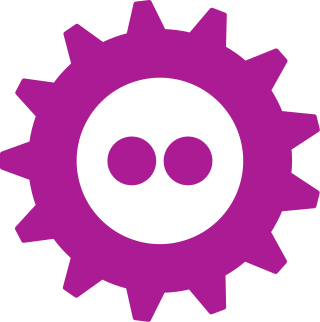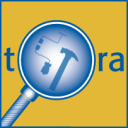
MySQL is an open-source relational database management system (RDBMS). Its name is a combination of "My", the name of co-founder Michael Widenius's daughter My, and "SQL", the acronym for Structured Query Language. A relational database organizes data into one or more data tables in which data may be related to each other; these relations help structure the data. SQL is a language that programmers use to create, modify and extract data from the relational database, as well as control user access to the database. In addition to relational databases and SQL, an RDBMS like MySQL works with an operating system to implement a relational database in a computer's storage system, manages users, allows for network access and facilitates testing database integrity and creation of backups.

PostgreSQL, also known as Postgres, is a free and open-source relational database management system (RDBMS) emphasizing extensibility and SQL compliance. PostgreSQL features transactions with atomicity, consistency, isolation, durability (ACID) properties, automatically updatable views, materialized views, triggers, foreign keys, and stored procedures. It is supported on all major operating systems, including Linux, FreeBSD, OpenBSD, macOS, and Windows, and handles a range of workloads from single machines to data warehouses or web services with many concurrent users.

SQL-Ledger is an ERP and double entry accounting system. Accounting data is stored in an SQL database server and a standard web browser can be used as its user interface. The system uses the Perl language with a database interface module for processing and PostgreSQL for data storage which is the preferred platform. The download version also includes schemas for IBM's DB2 database server as well as Oracle.
Oracle Database is a proprietary multi-model database management system produced and marketed by Oracle Corporation.

Free and Open source Software Developers' European Meeting (FOSDEM) is a non-commercial, volunteer-organized European event centered on free and open-source software development. It is aimed at developers and anyone interested in the free and open-source software movement. It aims to enable developers to meet and to promote the awareness and use of free and open-source software.
Oracle Rdb is a relational database management system for the OpenVMS operating system. It was originally released by Digital Equipment Corporation (DEC) in 1984 as VAX Rdb/VMS.

HSQLDB is a relational database management system written in Java. It has a JDBC driver and supports a large subset of SQL-92, SQL:2008, SQL:2011, and SQL:2016 standards. It offers a fast, small database engine which offers both in-memory and disk-based tables. Both embedded and server modes are available.

TOra (Toolkit for Oracle) is a free software database development and administration GUI, available under the GNU General Public License. It features a PL/SQL debugger, an SQL worksheet with syntax highlighting, a database browser and a comprehensive set of database administration tools.

Lazarus is a cross-platform, integrated development environment (IDE) for rapid application development (RAD) using the Free Pascal compiler. Its goal is to provide an easy-to-use development environment for developing with the Object Pascal language, which is as close as possible to Delphi. It is free and open-source software with different parts released under different software licenses.
In computing, a solution stack or software stack is a set of software subsystems or components needed to create a complete platform such that no additional software is needed to support applications. Applications are said to "run on" or "run on top of" the resulting platform.
Multi-licensing is the practice of distributing software under two or more different sets of terms and conditions. This may mean multiple different software licenses or sets of licenses. Prefixes may be used to indicate the number of licenses used, e.g. dual-licensed for software licensed under two different licenses.

LAMP is an acronym denoting one of the most common software stacks for the web's most popular applications. Its generic software stack model has largely interchangeable components.
The SQuirreL SQL Client is a database administration tool. It uses JDBC to allow users to explore and interact with databases via a JDBC driver. It provides an editor that offers code completion and syntax highlighting for standard SQL. It also provides a plugin architecture that allows plugin writers to modify much of the application's behavior to provide database-specific functionality or features that are database-independent. As this desktop application is written entirely in Java with Swing UI components, it should run on any platform that has a JVM.

LYME and LYCE are software stacks composed entirely of free and open-source software to build high-availability heavy duty dynamic web pages. The stacks are composed of:

Apache Drill is an open-source software framework that supports data-intensive distributed applications for interactive analysis of large-scale datasets. Built chiefly by contributions from developers from MapR, Drill is inspired by Google's Dremel system. Drill is an Apache top-level project. Tom Shiran is the founder of the Apache Drill Project. It was designated an Apache Software Foundation top-level project in December 2016.

Fat-Free Framework is an open-source web framework distributed under the GNU General Public License and hosted by GitHub and SourceForge. The software seeks to combine a full featureset with a lightweight code base while being easy to learn, use and extend.
FoundationDB is a free and open-source multi-model distributed NoSQL database developed by Apple Inc. with a shared-nothing architecture. The product was designed around a "core" database, with additional features supplied in "layers." The core database exposes an ordered key–value store with transactions. The transactions are able to read or write multiple keys stored on any machine in the cluster while fully supporting ACID properties. Transactions are used to implement a variety of data models via layers.
Percona Server for MySQL is a distribution of the MySQL relational database management system created by Percona. It is similar to MySQL Enterprise from Oracle Corporation.
The following outline is provided as an overview of and topical guide to MySQL:

DBeaver is a SQL client software application and a database administration tool. For relational databases it uses the JDBC application programming interface (API) to interact with databases via a JDBC driver. For other databases (NoSQL) it uses proprietary database drivers. It provides an editor that supports code completion and syntax highlighting. It provides a plug-in architecture that allows users to modify much of the application's behavior to provide database-specific functionality or features that are database-independent. This is a desktop application written in Java and based on Eclipse platform.











